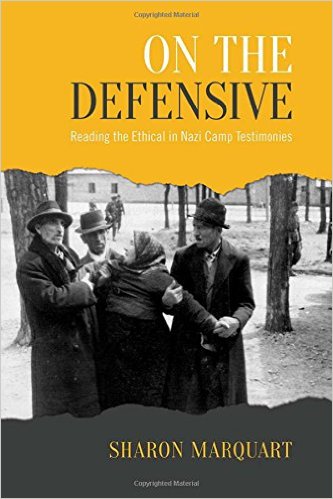
Référence bibliographique: Sharon Marquart, On the Defensive: Reading the Ethical in Nazi Camp Testimonies, Toronto, Buffalo, and London: University of Toronto Press, collection "University of Toronto Romance Series", 2015.
EAN13: 9781442650664.
$55.00.
Sharon Marquart, On the Defensive: Reading the Ethical in Nazi Camp Testimonies
Présentation de l'éditeur:
On the Defensive considers how our ethical responses to the Nazi camps have unintentionally repressed and denied the experiences of their victims. Through detailed readings of survivor narratives, particularly the works of political deportees Jorge Semprun and Charlotte Delbo, Sharon Marquart examines how well-intentioned people – including victims, their family members, and readers of witness literature – respond to such testimony in ways that are understood as ethical by their communities but serve instead to ignore victims’ experiences.
As Marquart shows, collective disasters such as the Holocaust expose the limitations of our ethical theories. To cope with this instability we withdraw and defend ourselves through inattentive and formulaic responses that turn a blind eye to the plight of victims. Challenging contemporary theorizations of community, ethics, testimony, and trauma, On the Defensive is a far-reaching reflection on the ways in which communal understandings of our duties and responsibilities to others can facilitate the denial of an atrocity’s horrors.
Sharon Marquart is Assistant Professor of French in the Department of Languages and Literatures at Wilfrid Laurier University. She is co-editor, with David Caron, of Les revenantes: Charlotte Delbo, la voix d'une communauté à jamais déportée.
“On the Defensive brings an acute, sympathetic, but sometimes critical intelligence to the study of important testimonial texts, and it analyses them more closely and deeply than anything I have seen before. A rigorous and original contribution to Holocaust and trauma studies, this book questions a number of views about testimony and trauma which have become so entrenched that they are more often than not taken for granted.”
Colin Davis, Research Chair in French, School of Modern Languages, Literatures and Cultures, and Holocaust Research Centre, Royal Holloway, University of London.